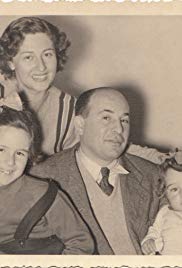
MAN ON THE BUS
Australia, 2019, 84 minutes, Colour/ Black and white.
Directed by Eve Ash.
Eve Ash is a prominent Australian psychologist who has made number of films, documentaries, television series and, now, an exploration of her family, uncovering a variety of mysteries.
While the film is set in the present, Eve’s mother, Martha, was an avid recorder of family, travels, friends, and left a box with many containers of these home movies. This documentary draws on them considerably.
Eve Ash explains her family background, her parents from Poland (now Ukraine), both married at the beginning of World War II but each losing their spouse. They experience the war differently, her father, Felix, in a local concentration camp but, with another man, getting a machine gun, affecting their escape and the deaths of all the guards. Felix and Martha meet and marry and then decide to migrate to Australia, arriving with their daughter, Helen. After some years in Australia, Martha gives birth to Eve.
Eve Ash visits the site of towns, castles, concentration camps in Ukraine and the audience gets an impression of the war experience and the internment of Jews in central Europe.
The screenplay for Man on the Bus offers a gradual unfolding of unusual events, anticipating a little, but keeping up the gradual pace. As a girl, Eve sees that she is different in appearance from her sister and speculates that she was adopted or has a different father. Neither of her parents offer any alternate explanations. However, in the footage, she discovers a man called Dixie and wonders about him and a relationship with Martha, especially with the way she films him and he responds.
The bulk of the film is the exploration to find out whether Dixie is actually her father. She co-opts help from her sister, Helen, who appears on screen, with reminiscences about the family and growing up, she and her daughters helping Eve in her quest. Later, Eve’s agent receives a mysterious email from Micheline who claims to be Dixie’s daughter and Eve’s half-sister.
This leads to further detective work, the audience puzzled and curious, yet invited into a very complex world of relationships, lies, betrayals. Eve and Micheline discover that Dixie has several more children, 10 in all. They also discover that he is still alive, was a surveyor, had named streets in the Melbourne suburbs after his lovers and children. He also stands for Labor Party pre-selection.
The last part of the film is the meeting with Dixie, the revelation, and his further opening up about his past, the 15 year relationship with Martha, even his presence at Eve’s birth. Yet, he had a great respect for Felix. Eve has many conversations with Dixie and even persuades him to be part of a re-creation of the events where Dixie and Martha met on the bus.
There are many scenes where Eve talks to family friends – and their immediate disbelief that there was such a scenario with Martha.
The end result is satisfaction for Eve to discover the truth, to deal with the situation and its ambiguities. However, Micheline still holds great animosity for her father.
An unusual story, not the 15 year relationship so much but Eve’s continual quest to discover the truth, puzzled about her mother and her behaviour, admiration for her father, Felix, and getting to know and have affection for Dixie.